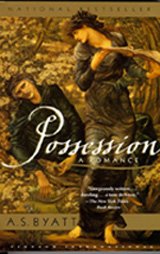
Well, I went ahead and finished this book, and to give credit where it is due, Setterfield stuck to her guns. She went ahead and kept to the ooky-spooky, pulling only one punch--rather than having two ghosts, she gave one a natural world explanation, but then she went full blown with the second one.
The time of the novel remains difficult to fix, although we do get intimations of telephones--but only when a storm blows the lines down, so it can't be used anyway. There is a brief scene with idled construction equipment--one of the crew uses his hands to mimic the biting motion of a steam shovel. So the odds are that this is supposed to be a modern day setting of what is essentially a high Victorian story.
Setterfield also acknowledges the artificality of this set up in a clever and knowing way. The narrator contracts a terribly high fever and collapses, waking up some days later in the care of the local doctor. His diagnosis? Too much reading of romantic fiction--Jane Eyre, Wuthering Heights, Sense and Sensibility. In the absence of poor nutrition or other privations of the sort suffered in the past, this patient will survive. He then (literally) prescribes Sherlock Holmes stories, to be taken twice a day until the course is complete.
There is a lot of blather about the mystic nature of twins and twinness, how a twin cannot be whole in the absence of the other. It makes for some arresting visuals, as one twin thinks she sees the other in her own reflections, but I am just too much a child of the scientific method to truly accept this Romantic idea. Twins, or more specifically, identical twins, were once "one" and divided into "two," but that division happens long before birth and brain development establishes each as individual.
Still--I enjoyed it. Setterfield has certainly digested her source material--we get a madwoman starting fires, one of which burns down the house and her in it. The governess doesn't marry the gentleman of the house, but she does marry someone. We get the secret keeping housekeeper who cares for a relative who is locked away and hidden from the narrator. And that is just Jane Eyre!
There is a delightful little inside joke--which would have been funnier if she hadn't explained it--where the governess thinks she sees the twins playing together, when one twin was definitely somewhere else. That night, the book on her nightstand is missing, replaced with "a novella by Henry James." Of course, that novella is "The Turn of the Screw" in which a nervous governess is convinced her charges are being followed by ghosts.

By the end, as Setterfield starts tying up the threads of her narrative, I was reminded of one of my all time favorite books: Possession, by A.S. Byatt. Byatt, too, ties things up a bit too neatly, with every orphan found a home, every document revealing its clues at precisely the right time. But a story like this calls for at least some endings to be happy. Byatt does a much better job of conveying the power of the authors she is creating than does Setterfield, but The Thirteenth Tale is a ripping yarn and fit to be enjoyed by the fireside this winter.
No comments:
Post a Comment